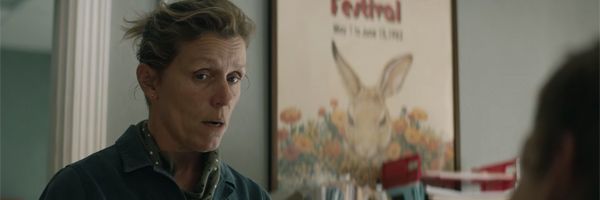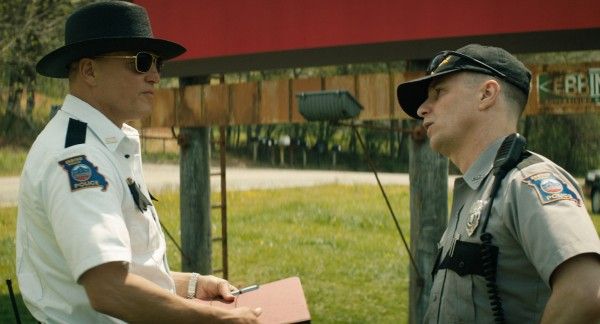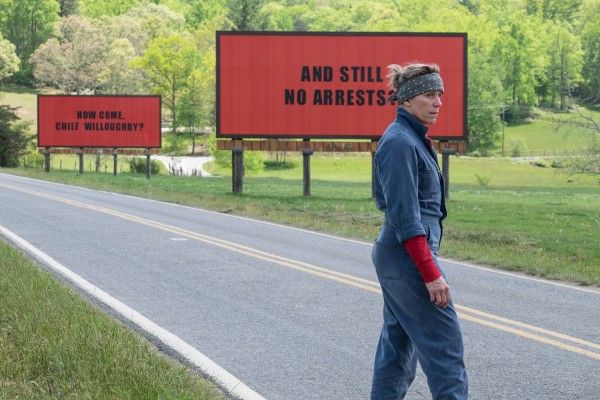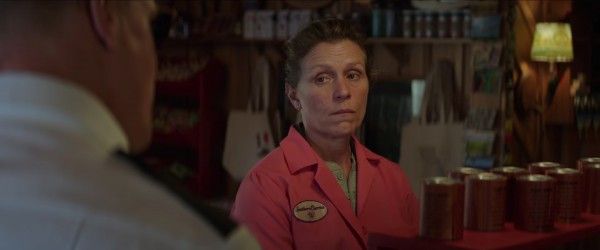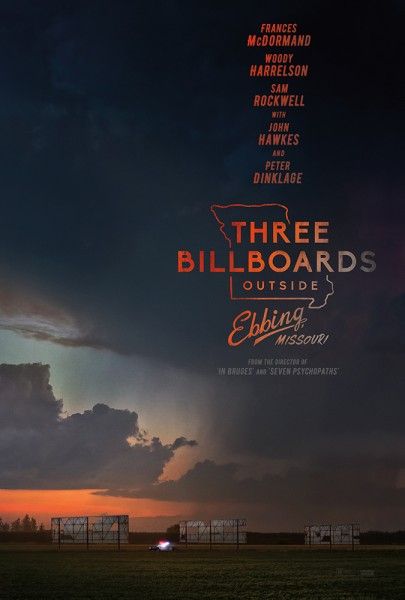[This is a re-post of our Three Billboards Outside Ebbing, Missouri review from the Venice Film Festival. The film opens in limited release on Friday, November 10th]
The impeccably titled Three Billboards Outside Ebbing, Missouri, the new film from In Bruges filmmaker Martin McDonagh, is a catalogue of American hatred. Principally, the two-sided hatred of police for protecting their own instead of facing the hatred that oozes within many police stations throughout the country.
McDonagh uses many hateful words toward people of color, homosexuals, and the police; The Show Me State is here to show us all sides of hate in Three Billboards. It focuses primarily on two characters where hatred of the other side is the basis of their character. Hatred of the police and hatred of civilians. There are a few characters who represent the gray area in between, who offer olive branches that are only received once each of the characters have been humbled. There’s a message that the only way to heal the gap between civilians and police in America is to work together as opposed to each side seeing the other as the opposition. There’s also the message that the only way to get through to the “bad apple” policeman is to take their gun and badge without paid leave or severance. These are agreeable messages for anyone who has a heart but Three Billboards only gets there by escalating violence—without nary an arrest on either side—to absurd heights. This is an extremely harsh movie that has some great moments, earns some uncomfortable laughs, but can’t complete the tightrope walk because the two principal forces that have to come together are complete caricatures of all-consuming grief and all-consuming above-the-law cop swagger. These aren’t characters as much as they are, ahem, billboards.
Frances McDormand plays Mildred, a foul-mouthed mother who is grieving the abduction, rape, and murder of her teenage daughter. The ugly incident happened seven months prior and the local police have made no arrests. She rents the three titular billboards on a small county road that’s mostly patrolled by police. In succession they read, “RAPED WHILE DYING,” “STILL NO ARRESTS,” “WHY, SHERIFF WILLOUGHBY?” They go up on Easter Sunday and Officer Dixon (Sam Rockwell) is the first to see them. The young black man putting up the signs recognizes Dixon from a previous incident and spits at his car.
When we first meet Sheriff Willoughby (Woody Harrelson) at work, he defends Officer Dixon—a bumbling idiot who can't even keep track of his badge—of his racist reputation by saying, “deep down he’s a good guy.” Sheriff Willoughby is actually a good guy. He fills the gray area in between the oppositional hatred, as a Sheriff should. He immediately goes to Mildred and explains that they have no DNA matches and no other evidence, there's very little that they can do at the moment, but calling attention to the matter could help her case.
Because this is Harrelson and McDormand, two greats at dark comedy, there are many great scenes between the two characters. In fact, the most human moment that Mildred has in her entire grumpy, crass, one-note role is in the police station with Willoughby. Willoughby has brought Mildred in for questioning because she’s been accused of assaulting a dentist with his own tools after he disparaged her billboards. The Sheriff has pancreatic cancer and is likely in his last few months of life. The two trade a few friendly barbs when Willoughby accidentally coughs blood on Mildred’s face. He looks in horror at the bloody splatter on her forehead and says, “I didn’t mean to do that.” And Mildred, the only time she lets down her tough act and shows some empathy for someone other than herself, says, “I know” and assists him.
Mildred has a number of monologues that earned applause at the Venice world premiere, for taking on the police, taking on the Catholic church, taking on her ex-husband (John Hawkes) who beat her and is now dating a 19-year-old woman (Samara Weaving, unfairly milked for laughs, who also inexplicably witnesses Mildred placed in a chokehold by her boyfriend with Mildred's son defending her with a knife to his dad’s throat and she just asks to use the bathroom; ha ha domestic violence!). Mildred’s a Greek Chorus of ills, but she’s no saint. McDonagh includes a brutal flashback where Mildred spars with her daughter (Kathryn Newton) over not being able to take her car to a party, the fight ends with the daughter walking off saying “I hope I get raped on the way” and Mildred says back “I hope you get raped on the way, too.” It’s easy to be in awe of McDormand’s gruff presence in Three Billboards, but to me, she’s a rotten character. Even when her son (Lucas Hedges) pleads with her to take down the billboards because he’s being picked on at school, Mildred brushes off his every concern. She has no empathy for anyone. Only hatred. I can’t applaud her monologues because the roots in them are in pure blanket statements of hatred for everyone in those chosen groups.
With McDormand as the Greek Chorus for the left side of hatred and Rockwell the bumbling bumper sticker for the right side of hatred, it’s unfortunate that Harrelson’s Sheriff is eventually reduced to a deus ex machina character. He writes a letter to each of them that begins a bridge. For Mildred, he says he’ll pay for the billboards to stay up past his oncoming death if the case remains unsolved. For Dixon, he says he’d become a good cop if he could just let go of his hatred and be a good person. Of course, Mildred and Dixon have more clashes and they escalate into ridiculous violence, but Sheriff Willoughby has provided them with the keys that will allow them to work together to find justice for her daughter.
McDonagh has other side characters whose presence is simply to quell the burning hate. Caleb Landy Jones as the advertiser who sells the billboards to Mildred and Peter Dinklage as a local man who seems to have an inexplicable crush on Mildred despite her always walking around dour, adding violence to the community, and nary even giving him a glance. But they’ll each be there at the right time to show Mildred and Dixon the errors of their ways.
McDormand can play an ox the whole way through and McDonagh is aware that he can make her extremely harsh because most of the audience will be on her side because she’s a mother who’s lost her daughter. But because Dixon is played by Rockwell there’s always an uncomfortable attempt to make Dixon likeable even when he’s doing horrific things. And his plot device shift toward being a better person doesn’t feel earned so much as it is pushing the aforementioned agenda of working together into motion.
The lesson in Three Billboards is agreeable and the cast is stacked. But everyone, with the exception of the gray area that Harrelson’s character occupies, is paper-thin. So too are the tense talking points that pepper in strings of vulgarities but don’t reach a Quentin Tarantino or Coen Brothers' level of character illumination. It's an already emotionally brutal movie with even harsher edges and lazy plotting.
For many, these criticisms won’t matter because there are moments of dark humor that indeed land with some bite. And the whole film has a bombastic barnburner energy. But the ludicrous and unpunished escalation of violence and circumstantially easy plot and character devices are far too many to overcome for me. Because McDonagh’s narrative is rooted so deeply in hateful one-note characters there’s a distinct lack of humility that makes most dark comedies hum.
Grade: C

